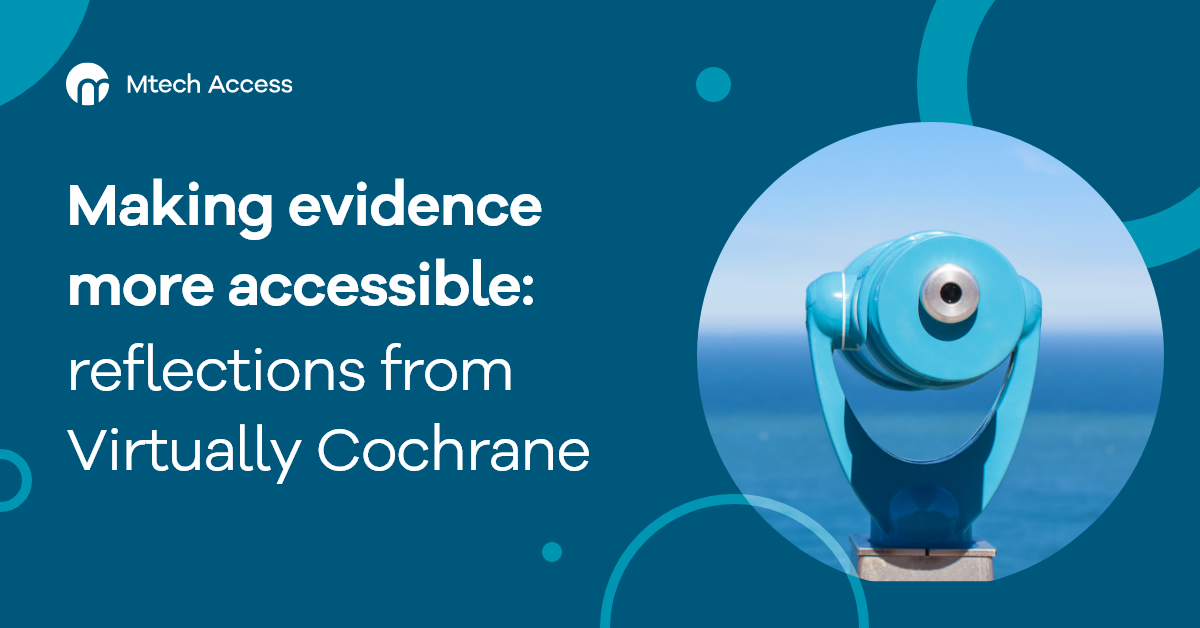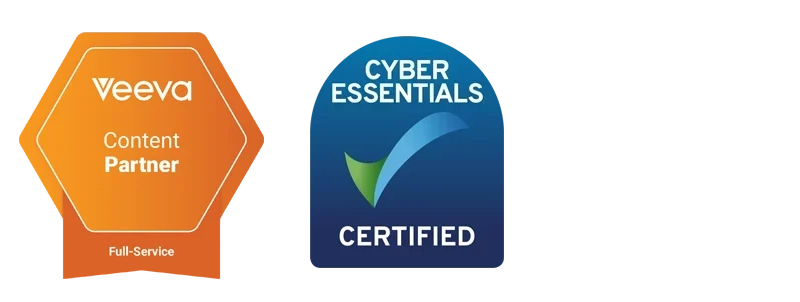
Last month, our evidence team tuned in to watch the Virtually Cochrane conference. Each year the Cochrane conference explores the latest thought leadership in systematic review and healthcare evidence. This year’s theme was ‘navigating evidence and uncertainty’.
Four Analysts from our Systematic Review team share their thoughts, reflections and insights from some of the sessions. Key themes include a broader awareness of the challenges posed by healthcare evidence amongst the general public and media since the pandemic, along with the risks of misunderstanding healthcare evidence, and what we can do to make evidence more accessible.
Communicating Risk and Uncertainty
Thoughts on the first session: ‘Communicating risk and uncertainty’
Speakers, Professor Jennifer Rogers (statistician) and Timandra Harkness (journalist), opened the conference with a session exploring the media’s communication of risk and uncertainty throughout the COVID-19 pandemic.
Rogers began by examining the unique considerations and challenges for statisticians in answering the pivotal question, ‘How many people in the UK have COVID-19?’. Despite initially appearing to be a simple question of prevalence, the dynamic nature of the pandemic has resulted in the inability to sample a random population (the gold standard approach). She highlighted the ability of statisticians to adapt to dealing with suboptimal data. Rogers also reinforced the ethical importance of conveying data limitations for transparent communication of risk and uncertainty.
Harkness then discussed examples of successes and failures of the media in communicating COVID-19 data. These examples highlighted the necessity of actively and critically assessing data presented in the media, regardless of the source. Failures in communication were primarily exemplified through data that has been spun to fit a particular agenda through use of misleading jargon or presentation of figures. In contrast, various positive examples of clear and accessible statistical communication of vaccination blood clot risks were highlighted from mainstream newspapers. For example, The Sun provided a statistically supported, age-specific breakdown of the benefits and risks of the vaccine, whilst BBC News provided a comparison to other known risks to contextualise the statistics.
With the general public receiving increased mainstream exposure to medical statistics and the relevance of these data to the policies impacting our everyday lives, this session emphasised why critical conversations regarding risk and uncertainty have arguably never been more relevant or important.
Shared decision-making and the value of plain language summary
Key learning points from the sessions: ‘Better health decisions. Using Cochrane evidence in shared decision-making’ and ‘Cochrane’s Plain Language Summary Project: what have we learnt so far?’
These sessions saw two panels discuss shared decision making (SDM) between patients and clinicians, and the value of plain language summaries in systematic reviews.
SDM is increasingly becoming a focus in patient-centred care. It allows for a two-way exchange of information between the patient and physician, and supports patients in considering treatment options and securing informed preferences. A variety of information sources are available to supplement patient–physician dialogue; however, according to Pushparajah et al (2018), scientific journals ranked as the third most used source of health-related information among patients, after general internet searches and patient-specific websites. Accordingly, there is a need to improve access to reliable, high-quality information that can be used by patients to enhance their understanding of the available treatment options.
Systematic reviews and meta-analyses offer the highest quality evidence to patients, but they often contain complex terminology and demand a degree of medical literacy, which limits their accessibility to non-academic readers. To combat this, many organisations, including Cochrane, supplement their reviews with plain-language summaries (PLS), which simplify review findings and improve their accessibility. PLS, therefore, provide non-academic patients with a reliable source of disease-specific information, with which they can confidently engage in conversations with their physicians to best inform their shared treatment decision. Given the value of communicating systematic reviews to the general public, research organisations should continue to develop their service offerings, including PLS, with the view of improving information accessibility to inform SDM.
Systematic Review under stress
Reflections on the opening session of the final day: ‘Systematic evidence and the COVID-19 stress test: pass or fail?’
Whilst working at Mtech Access, I have learnt the importance of evidence in decision making. However, I had not taken the opportunity to think critically about systematic review methodology, accepting that, as systematic literature reviews are widely viewed as the gold standard of evidence generation and are conducted rigorously, any conclusions drawn could be trusted.
Having watched this session, I now know that this is not completely the case. Although a well-conducted systematic review can still be considered the gold standard, there can be faults within the methodology that can lead to false conclusions. In this webinar, Hilda Bastian (writer and meta-researcher) critically discussed the flaws in systematic reviews in relation to before and during the COVID-19 pandemic, as well as the situation we will be in once it has ceased. For example, Bastian talked about how systematic reviews conducted in April 2020 to determine the effectiveness of masks using data from before the COVID-19 pandemic led to misleading conclusions through limiting the study design of included studies to randomised controlled trials only. Additionally, Bastian highlighted the issue of personal bias, as two reviewers resolving differences with a third reviewer when conducting a systematic review would not eliminate bias if all three have the same personal bias, and asked what skills we need to reduce our own personal bias.
I found this webinar very interesting, and it changed my perspective of systematic reviews. I hope to apply what I’ve learnt as I read and undertake systematic reviews in the future.
Fact-checking health claims
Thoughts on the session: ‘iHealthFacts. Health claims – fact-checked’
There has been a tsunami of health claims circulating on social media since the pandemic, some of which are reliable but some of which are not! The World Health Organization has described this as an “infodemic”. People feel overwhelmed by the increasing amount of health information, which can lead to poorly informed health decisions, under- or overuse of health interventions, and unnecessary suffering.
This session was really interesting as it showcased one solution: iHealthFacts.
iHealthFacts is an accessible online resource where the public can easily and quickly check the reliability of health claims circulated by social media and supports people to make well-informed decisions about their health. iHealthFacts is focused on the Irish population, but health claims answered have a global relevance.
The public can submit claims that they would like to be fact-checked; health claims that are most important to the public, or could cause potential risk to the public, are prioritised. The fact-checking process is systematic and rigorous. Questions previously answered include:
- Does injecting disinfectant prevent or treat COVID-19?
- Does 5G affect the spread of COVID-19?
- Do dock leaves relieve nettle stings?
The answer for all three of these questions was no; the last of which surprised me as this is something I had thought for a long time! It was great learning about how systematic reviews are being used to inform public health information.
Our team attended Virtually Cochrane in order to learn about the latest advancements in evidence generation and advance their own skills, learning and development. Learn more about the Virtually Cochrane conference and the sessions discussed by our team at https://uk.cochrane.org/our-work/events/virtually-cochrane-2021. For more about our approach to people development and to enquire about our latest vacancies email careers@mtechaccess.co.uk.
If you’d like to know more about our approach to evidence generation, systematic literature reviews and meta-analyses please email info@mtechaccess.co.uk.


